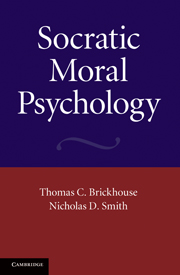Book contents
- Frontmatter
- Contents
- Acknowledgments
- Introduction
- 1 Apology of Socratic studies
- 2 Motivational intellectualism
- 3 The “prudential paradox”
- 4 Wrongdoing and damage to the soul
- 5 Educating the appetites and passions
- 6 Virtue intellectualism
- 7 Socrates and his ancient intellectual heirs: Plato, Aristotle, and the Stoics
- Appendix: is Plato's Gorgias consistent with the other early or Socratic dialogues?
- Bibliography
- Index of passages
- General index
7 - Socrates and his ancient intellectual heirs: Plato, Aristotle, and the Stoics
Published online by Cambridge University Press: 04 August 2010
- Frontmatter
- Contents
- Acknowledgments
- Introduction
- 1 Apology of Socratic studies
- 2 Motivational intellectualism
- 3 The “prudential paradox”
- 4 Wrongdoing and damage to the soul
- 5 Educating the appetites and passions
- 6 Virtue intellectualism
- 7 Socrates and his ancient intellectual heirs: Plato, Aristotle, and the Stoics
- Appendix: is Plato's Gorgias consistent with the other early or Socratic dialogues?
- Bibliography
- Index of passages
- General index
Summary
SOCRATIC AND PLATONIC MORAL PSYCHOLOGY
Contrasting Socratic with Platonic moral psychology
At the very beginning of this book, we defended distinguishing the Platonic Socrates of the so-called “early” or “Socratic” dialogues from the Socrates who speaks in what are called the “middle” dialogues. Developmentalists, generally, understand the “Socrates” of the middle dialogues to speak for Plato, whereas they take the “Socrates” of the early period either to present an earlier version of Plato's views, or to be Plato's more or less accurate representation of the historical Socrates (or both). This book provides further evidence for developmentalism – which, for the sake of convenience, we have characterized as making a distinction between Socrates and Plato, although, as we said earlier, we are not actually committed to the view that the “Socrates” of whom we speak is the historical philosopher by that name. But the evidence we have provided for the distinction remains somewhat unclear, especially because in one very important respect we have actually made the distinction we claim to be supporting somewhat more subtle and less vivid than it is in the standard accounts of Socratic moral psychology we have criticized. In standard accounts, recall, Socrates recognized no place at all in explanations of voluntary human behavior for appetites and passions. The only factors that play any role, in that view, are the desire – one shared equally by all people, good and bad – for our own benefit, and the cognitive states by which one judges courses of action as beneficial, detrimental, or neutral.
- Type
- Chapter
- Information
- Socratic Moral Psychology , pp. 193 - 247Publisher: Cambridge University PressPrint publication year: 2010



